What happened in the 2001 Recession?
As the economy headed into recession in 2001, businesses faced a classic pattern: they were producing more goods than customers demanded, causing inventories to build up. Companies then adopted painful measures to get production back in line with sales by cutting payrolls and slashing capital spending.
Those austerity measures then radiated throughout the economy, as they do in economic downturns, reinforcing any weakness that already existed. By early 2002, the economy had worked through the worst of the unwanted inventories, setting the stage for an important turning point.
In past cycles, with their shelves all but empty, firms typically increased production to restock their inventories, thus ushering in the first stage of renewed business investment. That restocking often provided a powerful boost early on in economic recoveries.
The second stage, renewed capital spending, typically followed soon thereafter to get the economy firing on all its pistons. In this cycle, however, something very different happened. Even as sales ticked up, companies hesitated to rebuild their inventories.
Corporate managers were confronted with an extraordinarily uncertain environment, including falling stock prices, sluggish corporate profits, and the possibility of war with Iraq. As a result, the inventory-to-sales ratio kept declining and fell to historic lows, arguably well beyond what could be justified by sophisticated management techniques like just-in-time inventories.
The Institute of Supply Management regularly asks the country’s manufacturers about their activities. The surveys confirm that manufacturing orders are being kept to the bare minimum and that inventories are not yet being rebuilt. But manufacturers are also reporting that it is getting more difficult to get supplies.
If that trend continues, suppliers will eventually need to boost production and increase capital spending. With continued demand – helped along by the inventory rebuild, government spending, low interest rates, and all that cash uncorked by home mortgage refinancing – manufacturing could snap back just like a rubber band.
A pickup in economic activity would boost corporate profits. As a result, the stock market, like the economy, could potentially perform better than many experts currently expect.
Anything I Missed?
So this is What happened in the 2001 Recession.
There you go guys, take all these points into account when entering the stock market.
And now I’d like to hear from you:
Or maybe you have a question.
Either way, let me know by leaving a comment below right now.

Hey I’m from reddit Satoshi Nakamoto.